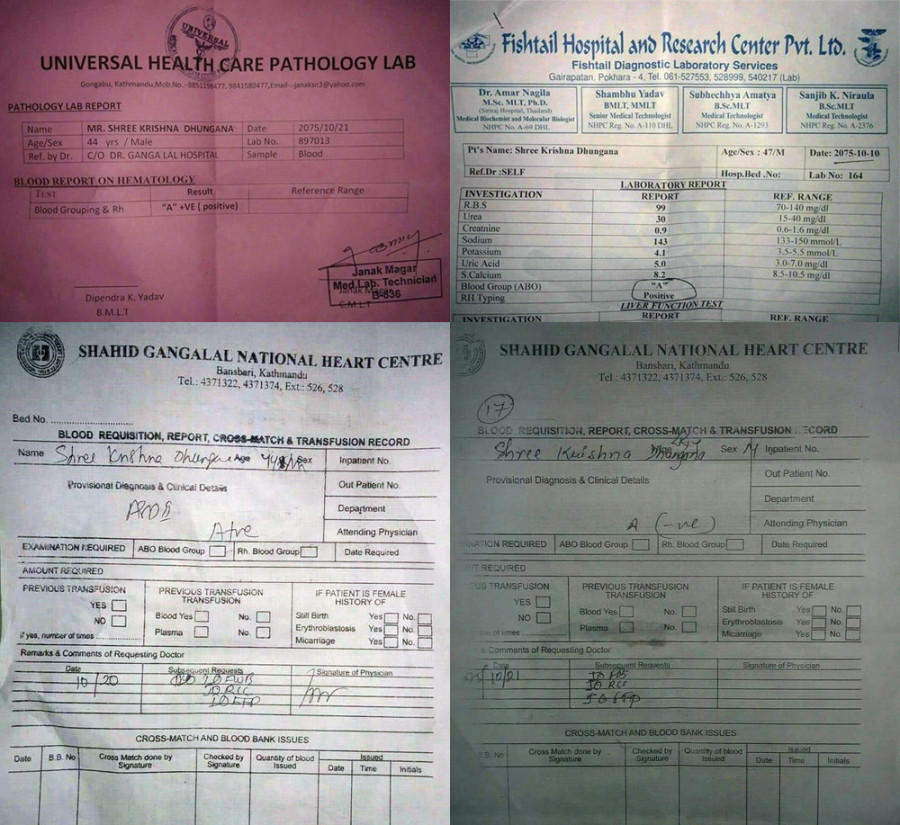Valley
A patient needs surgery—but hospital labs don't agree on the blood group
Shree Krishna Dhungana, a heart patient from Pokhara, has to undergo surgery at Shahid Gangalal National Heart Centre on Friday, but it is uncertain whether the operation will take place, as the hospital’s laboratory has failed to confirm his blood group.
Arjun Poudel
Shree Krishna Dhungana, a heart patient from Pokhara, has to undergo surgery at Shahid Gangalal National Heart Centre on Friday, but it is uncertain whether the operation will take place, as the hospital’s laboratory has failed to confirm his blood group.
According to Dhungana’s son Saurav, of the three blood grouping tests that were taken of his father, the laboratory presented two contradicting reports: A-negative and A-positive. Meanwhile, Saurav, a lab professional at Fishtail Hospital, in Pokhara, presented the laboratory officials with his report of his father’s blood group that reads A-positive.
Laboratory staff, however, questioned the reliability of the reagents and kits used in his test, and doctors at the heart centre asked him to arrange for A-negative blood to carry out the operation. “But the blood samples did not match with my father’s blood group during cross-matching,” said Saurav, who had struggled to find donors with A-negative blood group.
Saurav then conducted another blood grouping test of his father in a private lab in Gongabu, the report of which reads A-positive.
The lab at Gangalal Heart Centre then asked Saurav to conduct his father’s blood grouping test at Grande International Hospital in Kathmandu. “I am still waiting for a report from Grande Hospital. I am not sure if the operation will happen as per schedule,” he said.
According to cardiologists at the hospital, 44-year-old Dhungana needs surgery because there is a 2.7 mm hole in his heart. Bindeshwor Yadav, the laboratory chief at the centre, admits that contradicting reports were produced by the laboratory. According to him, same reagents of the same batch were used in all of the three tests, but the laboratory did not have the facilities to conduct reverse grouping and subgrouping.
“It could happen in one in 1,000 cases,” said Yadav, who added that the hospital had sent Dhungana’s blood sample to Grande Hospital for grouping and would send it to Central Blood Transfusion Service if Grande Hospital produced a contradicting report as well.
Director at the National Public Health Laboratory, Dr Harischandra Upreti, said that it was impossible to produce reports with different blood grouping in adults. “It will be difficult to establish blood grouping of children under three months old but it is impossible in adults,” he said.
Upreti questioned the quality of kits and reagents used by the hospital laboratory. “A lot of people who have undergone tests in different labs and received different reports come to our laboratory for an authentic report,” said Upreti, who added that there is no agency in the country to regulate the quality of reagents.
According to Upreti, the NPHL only regulates the government laboratory and laboratories registered under NPHL. “Hundreds of laboratories operate without permission,” he said. “We do not monitor them.”
Correction: The headline of this article has been changed to reflect that the hospital laboratories produced conflicting blood group results, not the doctors.




 12.58°C Kathmandu
12.58°C Kathmandu













